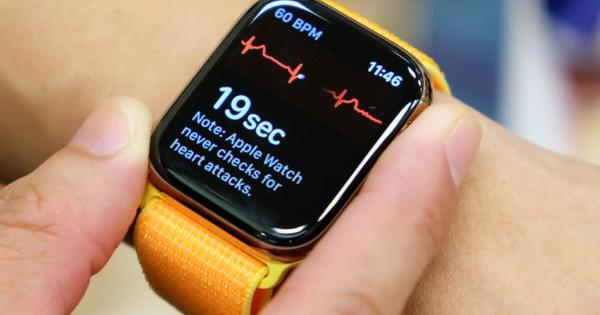A New York cardiologist claims Apple (NSDQ:AAPL) is infringing his patent for a device to detect atrial fibrillation.
Dr. Joseph Wiesel, a clinical assistant professor of cardiology at New York University School of Medicine, was granted the 7,020,514 patent in 2006 for a “method and apparatus to determine possible atrial fibrillation.”The apparatus comprises a detector, a processor, an algorithm and an indicator to detect and communicate the possible atrial fibrillation.
The detector covered by the patent contains an inflatable-cuff device and a sphygmomanometer and can detect changes in light transmitted through a person’s appendage. The indicator includes “an output device selected from a group consisting of a printer, a display, an auditory signal generator, and a vibration signal generator,” the ‘514 patent says. “Pulse beats may be monitored by use of an inflatable cuff wrapped around a person’s appendage, such as an arm, which detects the pulse beats by either oscillometric or auscultatory means.”
Atrial fibrillation is an irregular heartbeat that can eventually cause blood clots, stroke, heart failure and other heart-related complications. Approximately 2.7 million Americans are currently living with AF, according to the American Heart Association.

Wiesel claims to have “invented and perfected a method and device for detecting atrial fibrillation by assessing whether a pulse rate pattern is regular or irregular, using sphygmomanometry or photoplethysmography.”
Wiesel has been issued five patents and has filed patent applications for other unspecified items to detect atrialfibrillation, according to the lawsuit. Wiesel claims he notified Apple in 2017 that the company was infringing the ‘514 patent with all five series of the Apple Watch. Wiesel also claims he provided Apple with “detailed claim charts highlighting the elements” of his patent and “mapping them to elements of Apple’s Watch products.”
Apple watches use a photoplethysmography sensor to detect atrial fibrillation and a method for monitoring changes in light transmitted through an appendage to detect irregular pulse rhythms, the lawsuit says.
“Dr. Wiesel’s patented technology is a critical part of the Apple Watch and is used to drive customer demand,” it adds. “Dr. Wiesel’s innovations, as described in the patent-in-suit, were pioneering steps in atrialfibrillation detection.”
The lawsuit also cites the 419,297-patient Apple Heart Study, conducted by Stanford Medical School, to that the device is capable of aiding in the detection of atrial fibrillation using its light-sensor based technology. Results of that study were published in November in the New England Journal of Medicine.
Apple did not respond to a request for comment.
